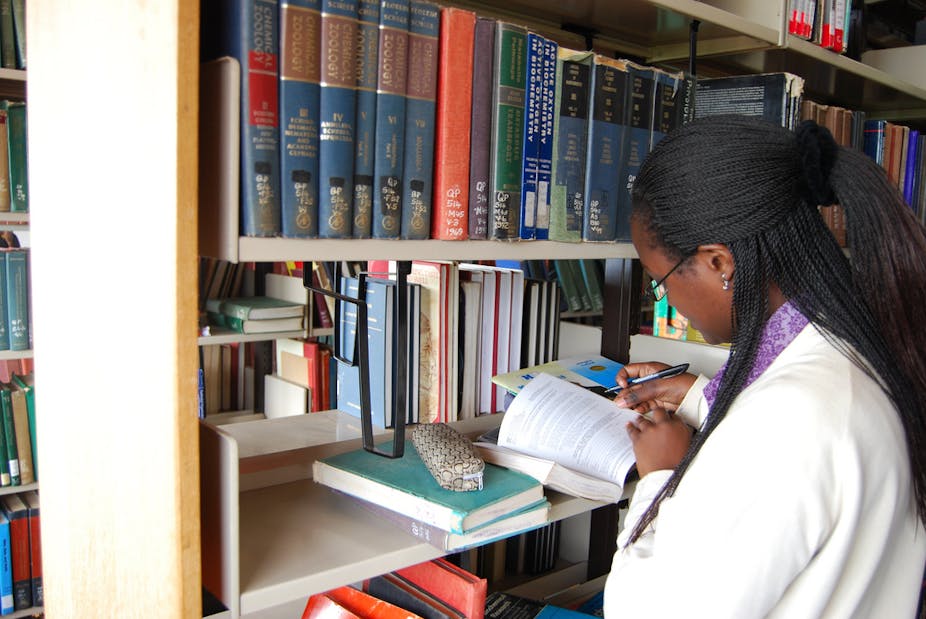Universities libraries in the developed world are struggling to pay academic journal subscription costs – so how can universities in developing countries hope to pay?
In this Q+A, Professor Adam Habib, Deputy Vice-Chancellor Research, Innovation and Advancement at the University of Johannesburg outlines some of the ways a for-profit academic journal model affects developing countries.
What sorts of costs are involved for a researcher who wants to get his or her paper published in a top journal?
It differs from journal to journal. In some journals, it may involve a couple of hundred dollars, in others it may be a thousand or two. Researchers sometimes have to pay for this themselves. However, where universities have some resources, these costs are often borne by the university.
This is ironic, is it not? The costs of the research are borne by the university either in the form of subsidising direct research costs, establishing the research infrastructure and paying the salary of the researcher.
Then, the university again has to expend resources, purchasing the research output that its resources enabled the production of in the first place.
Once peer reviewed, the author of research sometimes has to sign over the copyright to the academic journal. What problems does this present?
The most obvious is that the author cannot distribute his research product as widely as he or she may want to because they may be violating copyright law.
The interest of the publishing houses is for someone to buy the article, not to enable its dissemination to the widest audience possible. The primary interest of any researcher is to get his or her research out to the widest possible audience.
The profit motive in the publishing houses therefore acts as a constraint on the dissemination goal.
Once published, what sorts of costs does the university have to bear to get subscription to the journal in which their researcher’s work is published?
The universities pay a fortune subscribing to journals. Any librarian in the developed or developing world will tell you that the costs of academic journals is running way beyond inflation and library budgets.
The net effect is that universities, especially those in the developing world, cannot have access to important journals. The net result is that students suffer, particularly the poorest and the most vulnerable.
What are your criticisms of this system?
Well, it is a completely feudal system.
The costs of the research production are borne by the universities, and as a result, by public monies, in most cases. Then, private companies publish the research, and charge the universities and public institutions for the very research outputs that they paid for. This is effectively the subsidy of the private sector by public money.
There is a myth that this is an example of entrepreneurialism. In my view, all it does is facilitate enrichment at public cost with huge consequences for those most disadvantaged.
Why don’t we often hear academics and universities speaking out on this issue?
Academics are increasingly being heard on this issue. The growth of the open access movement across the developed and developing world is one academic response to the enrichment dynamics inspired by the commercialisation of the academic publishing industry.
But we obviously could have been heard earlier and louder. One reason this may not have happened is because academics could not envision what an alternative model of academic publishing would involve.
Also there has been an assumption in governance and other decision-making circles across the world that the only efficient way of organising activities is by relying on market mechanisms. This crude, un-nuanced perspective did not want to understand the social costs of an unregulated market, with the result that issues of equity and impact on marginalised communities were not worthy considerations in decision-making in this regard.
The academic sector is therefore merely reflecting the prevailing consensus that seem to govern our societies. Only when these assumptions came under attack after the unravelling of the Washington Consensus, did academics and others look at alternative models of organising the distribution of academic knowledge.
How is this system affecting universities from developing countries?
It is not fair at all. It impacts negatively on all our societies, but its most devastating consequences have been on the poor and marginalised of our world.
Simply put, students from poor backgrounds in large parts of the developing world will not have access to quality academic journals in their universities. This means that they will not be as well trained, and as a result will not have the same opportunities as the privileged. Is this not a violation of the principle of equal opportunities for all.
What should be done instead?
Well, one alternative would be to fund academic journals directly through the public purse.
The reason that academics resort to the private publishing industry is because of a lack of funds to underwrite the costs of producing their journals. If public monies were made available for this, then they would not be obliged to resort to the commercial sector.
And this need not be new money. After all, it is ultimately public money that underwrites the academic libraries which are the main market for these journals. A simple reorganisation of public funds could then enable the public financing of academic journals.
If this is not realisable in the immediate short term, one could look to regulating the commercial academic publishing industry.
There are already existing models of doing this in other sector. For instance, there are a number of international protocols governing the health care industry to ensure the provision of life saving drugs including the provision of anti-retrovirals for HIV-AIDS sufferers. Could similar protocols not be developed for the commercial academic publishing industry?
After all, higher education is an important public good on which inclusive and equitable development across the world is dependent.

